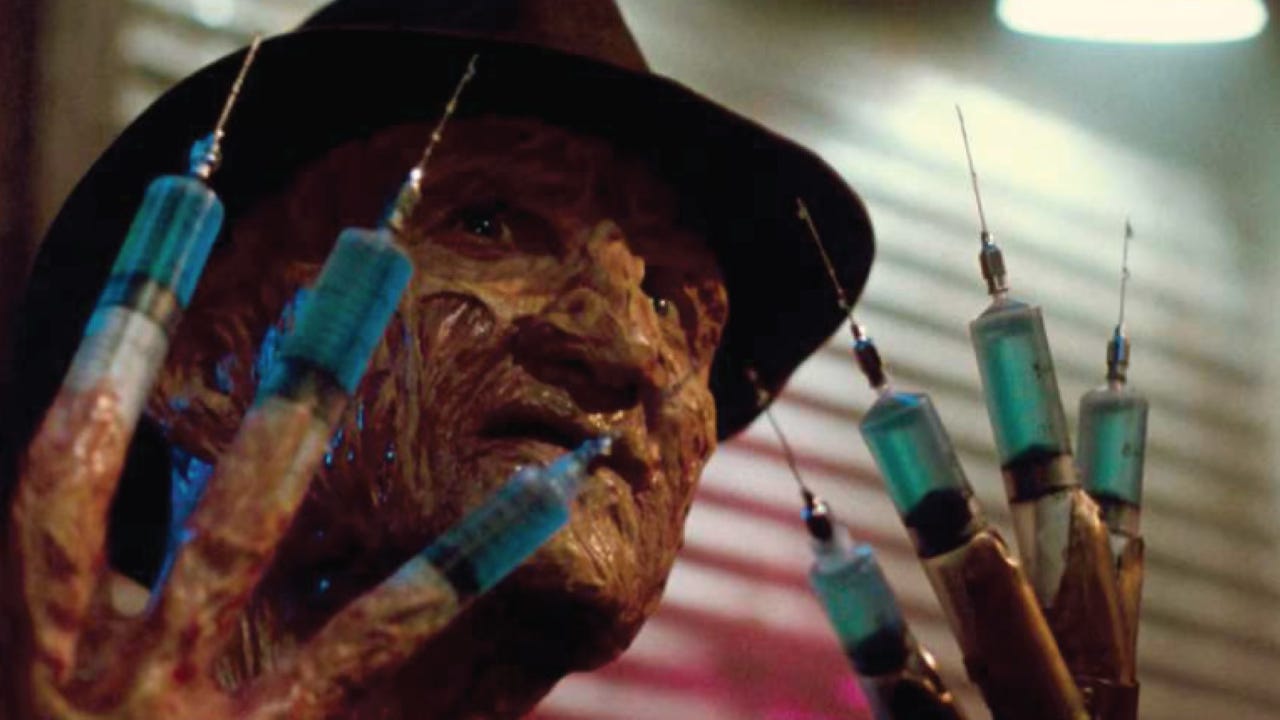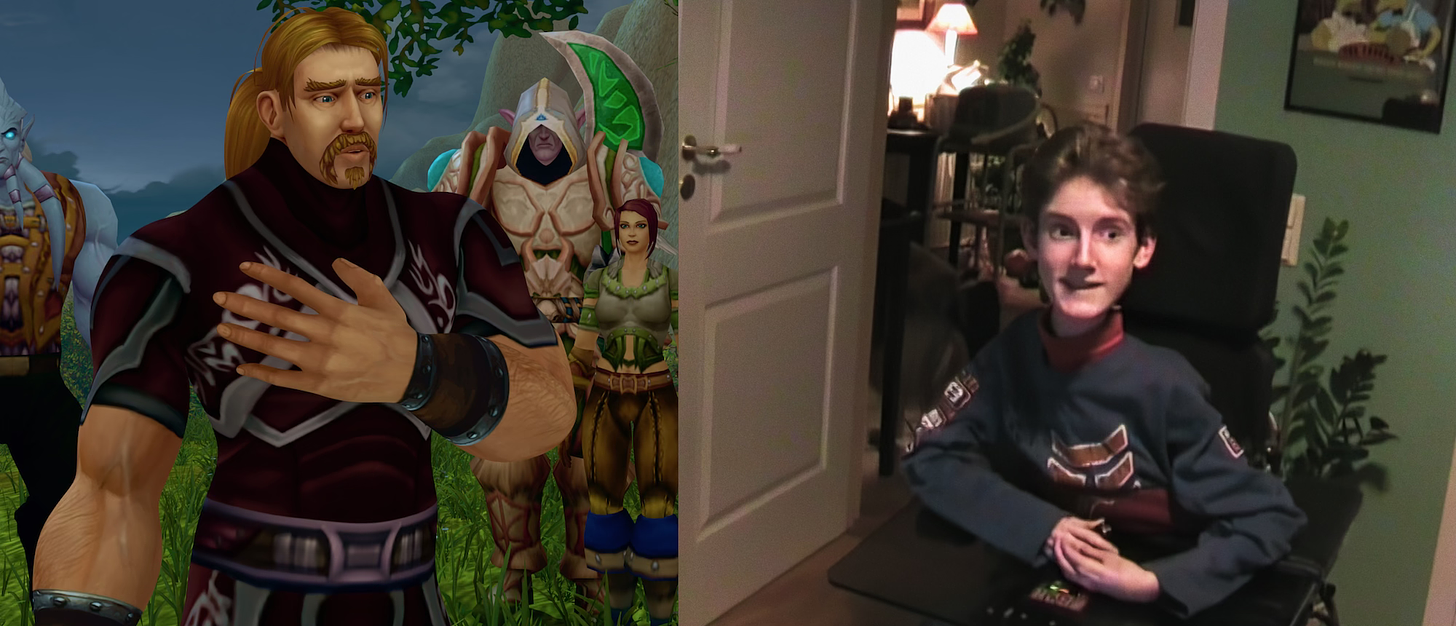Maybe the Internet Wasn't a Total Mistake
'The Remarkable Life of Ibelin' shows online gaming has a role to play in making human connections.
A frequent refrain from the terminally online like myself is, “The Internet was a mistake.” I’m fully aware of the hypocrisy of this statement. I made a career writing about movies because of the Internet. My wife and I met because of a dating app. I can share my thoughts with countless strangers right now because of the Internet.
However, while we have seen the promise of the Internet, we’ve also seen not only the dark side of online interactions but how those dark impulses have been thoroughly monetized by Silicon Valley. To quote my friend, the late film critic James Rocchi, “The Internet has made us meaner, poorer readers, and poorer writers.” But if we want to get specific, the main culprit of Internet angst is social media. We’re encouraged to give in to our meanest impulses and share the most inflammatory takes, whether we agree with them or not. As the saying goes, “enragement is engagement.” And that’s even before you get to the multitude of scams and abuse that permeate online spaces. How could anything good come out of this?
But The Remarkable Life of Ibelin, the new documentary from Norwegian director Benjamin Ree (The Painter and the Thief), shows the power of online connection in a way that doesn’t flatter platform or technology. Instead, it raises the question of what it means to live life in an online space. Despite so much of our modern lives requiring some kind of Internet connection, it still feels like we delineate our online actions as a second life. That’s why we have the abbreviation “IRL” (In Real Life) and tell people who seem warped by online bubbles to “touch grass.” Is a digital life inherently an artificial one?
Ree’s documentary concerns the life of Mats Steen, a Norwegian man who died at the age of 25 due to a degenerative muscular disease. Steen was born with the illness, and at a young age, he required a wheelchair. Unable to run around with children his age, Mats spent more time gaming, moving from a Game Boy until he found the game that consumed most of his time, the Massive Multiplayer Online Role Playing Game (MMORPG) World of Warcraft. In this online world based heavily on fantasy lore, Steen could become Ibelin, a wandering adventurer/private detective. He could also forge relationships with people who wanted to know not only “Ibelin” but also the player behind him.
Because Ibelin’s guild saved all his chats and logged all of his actions, Ree can recreate Ibelin’s relationships and actions by animating them within World of Warcraft. We see Ibelin as Steen and his guildmates saw him, and this opens up the story beyond the handful of home videos we have of Steen. More importantly, Steen wanted people to know his story. He kept a blog where he shared his thoughts, and he left behind his login password for his parents so that they could communicate his passing to his readers and friends. The message Steen sent, and the one that comes through the movie, is that while his body was confined to a chair, his mind and his heart were not. He touched people’s lives even though they never met him face-to-face.
More importantly, not every interaction was sunshine and rainbows. There were positive relationships, but Steen could also be callous with other’s feelings. He was, like all of us, imperfect, and even though he had control of an avatar, he didn’t have control of other players. The online space may have been digital, but the friendships, heartbreak, and romances were real. Can we tell someone confined to a wheelchair and unable to speak because their larynx is too weak that their life doesn’t count because it refuses to conform to a world built for physical mobility?
The film’s advocacy for Steen comes alive because it’s more concerned about showing the fullness of his humanity and his relationships rather than serving as an ad for World of Warcraft or any other MMORPG. Furthermore, Ree never goes so far as to argue that we’ve got online spaces wrong or that they don’t need regulation. But it does feel like a rebuke to the outdated thinking that the only kind of social relationships or worthwhile activities for kids is to go outside and play. We’ve accepted the Internet into so many facets of our lives, and no one thinks twice about using it for financial ends. It’s ridiculous to say that real business happens on paper. There’s no reason to accept that real relationships can only happen in person.
Rather than saying that Steen lived a dual life, The Remarkable Life of Ibelin is a poignant and insightful celebration of how Steen forged a reality with the limited tools and time at his disposal. To see someone living their life in an online fantasy space may, at first glance, seem sad and lonely, but through Mats Steen and Ibelin, we see life being lived to its fullest.
The Remarkable Life of Ibelin arrives on Netflix on October 25th.
What I’m Watching

I have now seen all seven of the original A Nightmare on Elm Street movies. While there are still plenty of other long-running slasher franchises I still need to complete, I’m glad I’ve checked Nightmare off the list since it has quite a few strong entries. The original movie still holds up after forty years, and some of the sequels endeavor to push the concept forward in exciting ways. Even the bad movies illustrate how to fall into a rut when telling Freddy Krueger stories (introduce a bunch of one-dimensional teens and then have Freddy kill them in a way that ties into the only thing we know about their character). But I’d say that the first three movies, along with Wes Craven’s New Nightmare, are all well worth your time. I still haven’t seen the 2010 attempt at a remake, but considering that I’ve only heard it’s dreadful, I’m not in any hurry.
I also watched the last episode of Uzumaki, and it’s better to look at only the first episode and imagine “What if?” rather than trod to the end. I feel bad for everyone who worked on it because if given the time and resources to make each episode as good as the first, they would have had an incredible series. As it stands, the remaining three episodes show that without the proper attention, adapting Ito’s work can slip from creepy to silly.
What I’m Reading
Here are a few articles that caught my attention in the last week:
Keep Kamala & Carry On by John Heilmann [Puck] - I’ve had to accept that from now until election day, my anxiety is only going to climb. Part of this stems from 2016, where many in the political commentariat (and even politicians) assured us there was no way Donald Trump could win the Presidency. By comparison, 2024 is already telling us that the race is incredibly close, and so it’s difficult not to freak out a bit. After all, if Harris is competent and qualified, and Trump is talking about Arnold Palmer’s genitals and cosplaying as a McDonald’s employee, isn’t that somehow worse for Harris? Heilmann’s article does a good job of putting all this in perspective, and while it doesn’t erase my Election Day fears, it does elucidate why the race currently looks the way it does.
A Beginner’s Guide to Junji Ito by Daniel Dockery [Vulture] - With Uzumaki now wrapped up, I appreciated Dockery’s guide to diving further into the works of Junji Ito. While I wish the list was structured more around introductory works leading to deeper dives rather than a straight chronology, it still put quite a few books on my reading list.
I Don’t Trust the Supreme Court With the 2024 Election by Matt Ford [The New Republic] - It’s a little disheartening that the Supreme Court wields so much power and many Americans don’t even know who’s on the court. When they go to the polls, I doubt any will think of Trump v. United States and how Chief Justice John Roberts pulled a ruling of “absolute Presidential immunity” for “official acts” out of thin air. Ford does a good job of breaking down the lunacy of that decision and how we could be in for another Bush v. Gore situation if the 2024 Election reaches the nation’s highest court.
Trump: I Need the Kind of Generals Hitler Had by Jeffrey Goldberg (no relation) [The Atlantic] - While the headline emphasizes Trump’s admiration for dictators, his love of authoritarian powers, and his fascist impulses, the article also details how much Trump loathes people in uniform. He thinks they should do little parades for him and shoot protestors, but he also thinks that if they’re captured, wounded, or killed in combat, they’re disgusting losers and suckers. I suspect that if you asked people at Trump’s rallies if they support the troops, the answer would be an automatic “of course.” But if you asked them if they agreed with Trump’s evaluation that the troops were losers and suckers, they would deny he ever said such a thing (as Trump’s spokesperson does here). That’s how they square this circle: denial.
What I’m Hearing
Lin-Manuel Miranda and Pulitzer finalist Eisa Davis recently released Warriors, a concept album based on the 1979 Walter Hill classic The Warriors. While there isn’t a musical adaptation underway yet, listening to this, I find it difficult to believe that the concept album is the end of the story. But even if it is, Miranda and Davis have knocked it out of the park with a gender-swapped reimagining of the story and incredible music to go along with it. At the very least, I hope this guides a younger audience to check out the movie.
What I’m Playing
After listening to Warriors, I decided to give the 2005 video game a shot, but the emulation for PlayStation 5 does not work. It’s not that I expected a 2005 game released for PlayStation 2 to look incredible, but something happened where PlayStation 2 games that were emulated for PlayStation 4 can’t leap PlayStation 5 without a bunch of nasty visual artifacts that constantly flicker while you try to play. I encountered the same issue when I tried to play Ape Escape 2.
I keep trying to wait patiently for Horizon: Zero Dawn Remastered to arrive at the end of the month, but I decided to fire up Dredge, and so far I’m liking its design and little gameplay loop.




